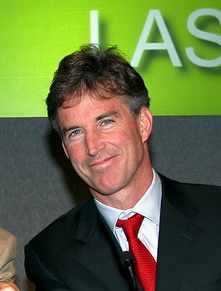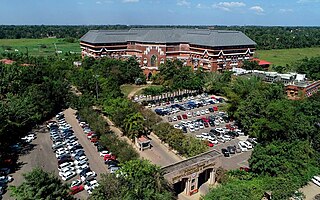Related Research Articles
Cardiothoracic surgery is the field of medicine involved in surgical treatment of organs inside the thoracic cavity — generally treatment of conditions of the heart, lungs, and other pleural or mediastinal structures.

Alfred Blalock was an American surgeon most noted for his work on the medical condition of shock as well as tetralogy of Fallot – commonly known as blue baby syndrome. He created, with assistance from his research and laboratory assistant Vivien Thomas and pediatric cardiologist Helen Taussig, the Blalock–Thomas–Taussig shunt, a surgical procedure to relieve the cyanosis from tetralogy of Fallot. This operation ushered in the modern era of cardiac surgery. He worked at both Vanderbilt University and Johns Hopkins University, where he studied medicine and later served as chief of surgery. He is known as a medical pioneer who won various awards, including Albert Lasker Clinical Medical Research Award. Blalock was also nominated several times for the Nobel Prize in Medicine.

Cardiac surgery, or cardiovascular surgery, is surgery on the heart or great vessels performed by cardiac surgeons. It is often used to treat complications of ischemic heart disease ; to correct congenital heart disease; or to treat valvular heart disease from various causes, including endocarditis, rheumatic heart disease, and atherosclerosis. It also includes heart transplantation.

John Webster Kirklin was an American cardiothoracic surgeon, general surgeon, prolific author and medical educator who is best remembered for refining John Gibbon's heart–lung bypass machine via a pump-oxygenator to make feasible under direct vision, routine open-heart surgery and repairs of some congenital heart defects. The success of these operations was combined with his other advances, including teamwork and developments in establishing the correct diagnosis before surgery and progress in computerized intensive care unit monitoring after open heart surgery.

Redmond P. Burke is an American congenital heart surgeon, innovator, software developer, author, inventor, and founder of The Congenital Heart Institute at Miami Children's Hospital in Miami, Florida. He starred in the ABC pilot television show The Miracle Workers. Burke has been recognized as one of the world's most innovative surgeons, and for his use of information technology to improve surgical outcomes.
Cardiothoracic anesthesiology is a subspeciality of the medical practice of anesthesiology, devoted to the preoperative, intraoperative, and postoperative care of adult and pediatric patients undergoing cardiothoracic surgery and related invasive procedures.
Norman Edward Shumway was a pioneer of heart surgery at Stanford University. He was the 67th president of the American Association for Thoracic Surgery and the first to perform an adult human to human heart transplantation in the United States.
Charles D Fraser, Jr. is the medical director and surgeon of the Texas Center for Pediatric and Congenital Heart Disease at Dell Children's Medical Center. Formerly, Fraser was chief of congenital heart surgery and cardiac surgeon-in-charge at Texas Children's Hospital, the nation's largest pediatric hospital, served as chief of the Congenital Heart Surgery Division at Baylor College of Medicine, and director of the Adult Congenital Heart Surgery Program at the Texas Heart Institute.
Robert Edward Gross was an American surgeon and a medical researcher. He performed early work in pediatric heart surgery at Boston Children's Hospital. Gross was president of the American Association for Thoracic Surgery, a member of the National Academy of Sciences and a fellow of the American Academy of Arts and Sciences.
James K. Kirklin is an American cardiac surgeon who has made significant scientific and surgical contributions in the fields of heart transplantation and mechanical circulatory support devices to assist the pumping action of the heart. He was formerly Professor of Surgery (1987-2022), Director of the Division of Cardiothoracic Surgery (2006-2016), Director of the James and John Kirklin Institute for Research in Surgical Outcomes (KIRSO) (2016–2022), and Co-Director of Comprehensive Cardiovascular Center (2011-2017) at the University of Alabama at Birmingham (UAB). While at UAB, he held the UAB Cardiovascular Research Chair (1998-2006), the John Kirklin Chair of Cardiovascular Surgery (2006-2017), and the James Kirklin Chair of Cardiothoracic Surgery (2017-2022).
Robert (Bob) Bartlett is an American physician and medical researcher who is credited with developing a lifesaving heart-lung technology known as extracorporeal membrane oxygenation (ECMO). He is an emeritus professor of surgery at the University of Michigan Medical School.

Believers Church Medical College Hospital (BCMCH) is a healthcare institution of Believers eastern Church based in Thiruvalla, Kerala, India. The Medical College is attached to a 750-bed, multi-speciality hospital. The Medical College, established in 2016, is situated in a campus of about 25 acres (10 ha) connected by rail and road.
Stanley John was an Indian cardiothoracic surgeon, a former professor at the Christian Medical College and Hospital (CMCH) and one of the pioneers of cardiothoracic surgery in India. He is reported to have performed the first surgical repairs of Ebstein's anomaly, Ruptured Sinus of Valsalva (RSOV) and Double Outlet Right Ventricle (DORV) in India. He assisted in performing the first open heart surgery in India while working at CMCH. During his tenure of 25 years at the institution, he mentored several known surgeons such as V.V. Bashi, A. G. K. Gokhale, J. S. N. Murthy and Ganesh Kumar Mani. Later, John joined Yellamma Dasappa Hospital, Bengaluru at the Department of Thoracic and Cardiovascular Surgery. He is an elected fellow of the National Academy of Medical Sciences, and the Government of India awarded him the fourth highest Indian civilian award of Padma Shri in 1975. He served as the 13th President of the Indian Association of Cardiovascular-Thoracic Surgeons (IACTS) between 1982 and 1983.
Gerald Buckberg was an American surgeon. His research initially centered in the area of myocardial protection and led to the introduction of blood cardioplegia, which is currently used by over 85% of surgeons in the United States and 75% of surgeons worldwide for adult and pediatric heart operations. He was a member of multiple surgical societies, including the American Association for Thoracic Surgery, American Surgical Association, and the Society of Thoracic Surgeons. He was Professor of Surgery at the David Geffen School of Medicine at UCLA.
Philip Caves (1940–1978) was a Northern Irish cardiothoracic surgeon. In 1972, while at Stanford University, he pioneered the use of the bioptome and transvenous endomyocardial biopsy in the early diagnosis of heart transplant rejection. It was considered the most significant advance in antirejection therapy of the time. Awarded the British American Research Fellowship in 1971, Caves worked with pioneering cardiothoracic surgeon Norman Shumway at Stanford and became staff surgeon leading the transplant programme by 1973. A year later he went to Edinburgh as a senior lecturer in cardiac surgery, where he became particularly interested in pediatric cardiac surgery.

Willis John Potts was an American pediatric surgeon and one of the earliest physicians to focus on the surgical treatment of heart problems in children. Potts set up one of the country's first pediatric surgery programs at Children's Memorial Hospital in Chicago.

Thomas L. Spray is an American cardiothoracic surgeon who served as Chief of the Division of Cardiothoracic Surgery and the Mortimer J. Buckley Jr. MD Endowed Chair in Cardiac Surgery at the Children's Hospital of Philadelphia and Professor of Surgery at the Perelman School of Medicine at the University of Pennsylvania. He retired in 2018.
Uwe Klima is UAE based professor of surgery and a faculty member at the Hannover Medical School, Germany. He also is the medical and managing director at German Heart Centre, Dubai.
Vasyl Lazoryshynets is a Ukrainian cardiac surgeon, director of the Mykola Amosov National Institute of Cardiovascular Surgery of the National Academy of Medical Sciences of Ukraine.
William Imon Norwood Jr., also Bill Norwood, was an American pediatric cardiac surgeon and physician. He was known for the Norwood procedure, a pioneering cardiac operation named after him for children born with Hypoplastic left heart syndrome.
References
- 1 2 Biolchini, Amy (August 13, 2012). "Renowned U-M pediatric heart surgeon reflects on career milestone of 10,000 surgeries". Ann Arbor News.
- 1 2 3 "Press Release: Edward Bove, M.D., appointed chair of new U-M Department of Cardiac Surgery". Michigan Medicine at the University of Michigan. 19 January 2012.
- ↑ Prager, RL; Bove, EL; Chang, AC; Orringer, MB (2016). "The University of Michigan Cardiac and Thoracic Surgery Program". Seminars in Thoracic and Cardiovascular Surgery. 28 (3): 705–711. doi:10.1053/j.semtcvs.2016.08.017. PMID 28285677.
- 1 2 Stringer, David (Summer 2000). "Rebuilding Babies' Hearts". Medicine at Michigan. University of Michigan. Archived from the original on 11 July 2002.
- ↑ Mavroudis, C; Jonas, RA; Bove, EL (April 2015). "Personal glimpses into the evolution of truncus arteriosus repair". World Journal for Pediatric & Congenital Heart Surgery. 6 (2): 226–38. doi:10.1177/2150135115572375. PMID 25870342. S2CID 6818302.
- ↑ "Certificate of Added Qualification in Congenital Heart Surgery" (PDF). American Board of Thoracic Surgery Newsletter. Spring 2006. Archived from the original (PDF) on 26 September 2006.